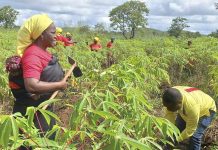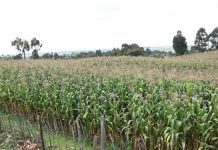Africa-Press – Botswana. Ms Christinah Mmanthebe aged 63, springs from her black Ancona plastic chair to heat up her cattle brand.
Her name was read out loud amongst a list of beneficiaries of the ongoing cattle restocking exercise in Mabolwe. The moment she had been waiting for ever since President Dr Mokgweetsi Masisi announced a compensatory livelihood package had finally come.
It is the penultimate stage of benefitting from government’s magnanimous gesture and Ms Mmanthebe was nearing the ultimate stage of rearing cattle again after losing hers to the cross-border livestock rustling that dogged Bobirwa region in over four decades.
Brandishing a red-hot cattle brand, Ms Mmanthebe handed it over to some members of Mophato, (tribal regiment charged with patrolling borders and thwarting livestock rustling) to apply the iron and leave a permanent mark that officially and legally hands the animals into her possession.
Ms Mmanthebe had to present her brand certificate and Omang to confirm her details before she could be officially issued with the five heifers, some of which could have mated already. Cattle selection prioritised female cattle of between 18 months and three years.
Finally, the heifers were branded and officially hers. She then bursts into fits of ululations and profuse thanks to the ministry and government officials for an act she had initially thought unattainable. She had arrived at 7am for 730am, so as not to miss on the package she direly needed.
Ms Mmanthebe is amongst the farmers who would be benefitting from a share of the 546 cattle aimed for restocking in Mabolwe. The exercise started and was completed at six other villages of Bobonong, Molalatau, Lentswelemoriti/Motlhabaneng, Gobojango, Semolale and Lepokole.
It started with phase one in January where farmers who opted for small stock and donkeys received their consignments. Farmers who had five or more cattle received five heifers while those who lost less received their exact number of lost animals.
While awaiting her brand to heat up, Ms Mmanthebe told BOPA in a brief interview that she had lost exactly five cattle in 2011 and was extremely delighted to receive the same number of lost animals. She had also lost 25 goats in the process.
Quizzed why she chose five cattle over 25 goats or sheep, Ms Mmanthebe expressed her love for cattle and the benefits derived from the same animal.
“I won’t be a beggar anymore. The good thing with cattle is that they are greatly helpful and valuable,” she said.
Another beneficiary, 60 year-old Ms Sekebu Madome who also received five cattle after losing 25 at different intervals from 2016 until 2019 said that she was happy to start afresh.
“I’m taking them to the cattle post where I will care for and feed them so that they in turn benefit me in the long run,” said Ms Madome showing off her brand and certificate.
After collecting their cattle, they received four bulls, one per each of the four clusters. Initially, President Dr Masisi explained, the heifers were to be artificially inseminated, but owing to challenges of drought the process would be slow with some heifers or an outright failure on others and hence provision of bulls.
The bulls, aged between two and four years, have passed suitability test.
Recipients of the restocked livestock were challenged to tend to livestock, to thwart losing them in a similar fashion in which they were being compensated for. Mephato were also commended for their relentlessness and selflessness in combating cross-border livestock rustling scourge.
“We will consider your proposals for strengthening cordon fence between Botswana and Zimbabwe amongst other suggestions you furnished us with,” minister of Agriculture Mr Fidelis Molao said at the handing-over of the animals to recipients.
The minster also thanked farmers who sold their animals to government, to aid the restocking exercise.
At the same event, Kgosi Joel Masilo called for high vigilance and care for the just-received animals. He also called for strengthening of security along the borders, and all stakeholders to exercise their roles in ensuring that the restocked animals did not follow the same route in which their predecessors were lost.
Kgosi Masilo also called for increment of picketers along the cordon fence that acted as a borderline between Botswana and Zimbabwe. He argued that reduction in the pickets and picketers could have handed livestock rustlers a free pass into and out of the country.
The restocking exercise benefitted 958 farmers with 180 getting sheep, 244 receiving 4 890 goats, 616 getting 2 827 cattle and 80 farmers benefitting 297 donkeys. In addition, clusters received 97 bulls.
For More News And Analysis About Botswana Follow Africa-Press






